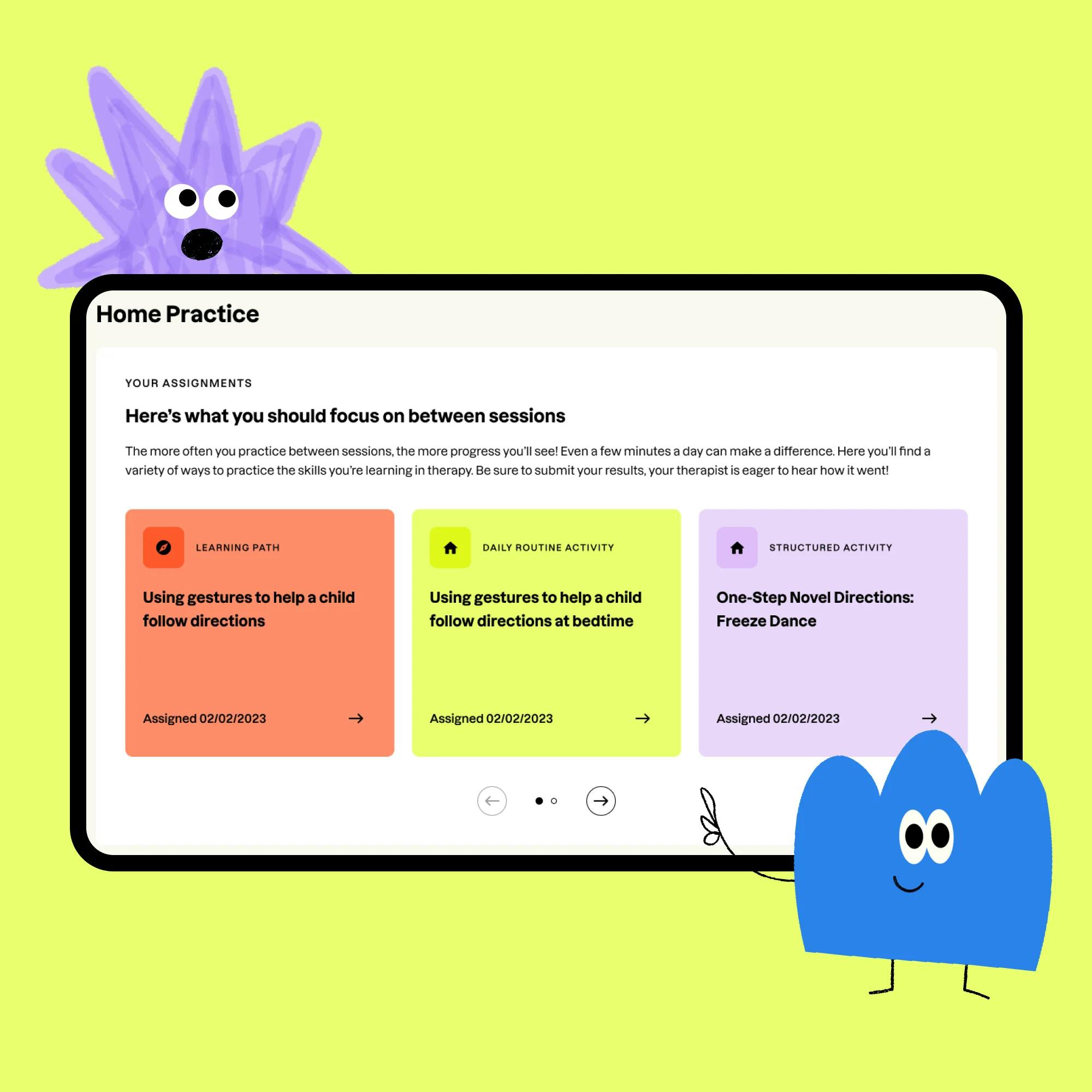It’s often recommended to have speech therapy sessions a few times a week. In some cases, you or your child may see more than one speech therapist. In this article, we answer common questions from clients about working with multiple speech therapists. The good news? It’s all to your benefit! Here’s what to expect.
Looking for a speech therapist?
Teletherapy makes it easy. We serve families with a range of speech, language, and feeding needs across the U.S. Get started today!
 Find a speech therapist
Find a speech therapistWhy might you work with multiple speech therapists?
If you or your loved one need speech therapy sessions more than once per week, you might be able to see the same speech therapist for every session. But this isn’t always possible. Sessions need to be scheduled on the days and times that work for you and your family. You need to be matched with a speech therapist who’s experienced in your area of need and available at those same times. Given those factors, it may not be possible to work with the same speech therapist for every session.
One of the most important aspects of speech therapy is attending the recommended number of sessions per week. More frequent, consistent therapy leads to faster progress. Working with more than one speech therapist can ensure you’re getting treatment at the frequency that’s right for your needs.
Let’s take a look at some of the benefits of working with multiple speech therapists.
4 benefits of working with more than one speech therapist
1 Collaboration on your care plan
When you’re treated by more than one speech therapist, you have multiple sets of professional “eyes” on your care. Every speech therapist is licensed and qualified to provide treatment, of course, but collaboration can be a bonus. Think of the saying “Two heads are better than one.” You get the benefit of multiple professionals with many combined years of experience providing treatment for you, your child, or your loved one.
One of the most important aspects of speech therapy is attending the recommended number of sessions per week.
2 Faster progress and less time in speech therapy
When you work with multiple speech therapists in order to reach your recommended number of sessions per week, you can make faster progress. Let’s say you need speech therapy two times per week, but your therapist can only see you once a week. You could still reach your therapy goals, but it would take longer than if you had the two sessions.
Faster progress typically leads to graduating from therapy sooner. If you double your sessions to two times per week, it’s reasonable to assume you might even be done with speech therapy twice as fast!
Find the right speech therapist for your needs
Get started3 A variety of unique tools and strategies
While each speech therapist receives the same training and certification, they each bring their own unique experience, approaches, and treatment styles. Every speech therapist has seen their own caseload of clients throughout their professional career. And as you know, no client will look exactly like another.
Say a speech therapist is teaching your child articulation techniques or ways to build their language skills. There are many different ways to target these types of speech and language goals. Each therapist may have their own “tools in their toolbox” that have worked well with other clients. Sometimes, a slightly different technique can make all the difference in learning a new skill.
When you have multiple speech therapists, you have access to all their successful treatment approaches. And who wouldn't want that?


4 Opportunity to “carry over” skills between speech therapists
The goal of speech therapy is for the person to become as independent as possible in their new communication skills. To do this, we focus on “generalization.” This means generalizing, or carrying over, new skills from therapy sessions to other environments, such as home, school, and work.
Here’s an example: Say a person is working on using their AAC device to start conversations with others. We want them to be able to do this when they’re at the store or in school, not just during speech therapy sessions.
When a person is working with more than one speech therapist, they have to mentally “switch” to communicating with a different therapist. They have to transfer skills they’ve worked on with one therapist to the other. This allows them to practice early skills of generalization in a supportive therapy environment. This can make carryover to other environments easier down the road.


Therapist communication leads to seamless care
At Expressable, we make it easy for our speech therapists to communicate with each other (after all, communication is what we’re all about!). If you have more than one Expressable therapist, they have several ways to update each other and collaborate on your care. Both therapists will have access to your chart through our HIPAA-compliant medical records platform. Each week, they can review your latest session notes, goal progress, and home practice assignments, and use that information to plan your next session.
Our speech therapists also collaborate via meetings and messaging to ensure important information gets communicated clearly. Expressable therapists work remotely, but they’re in constant contact with each other through video chat and messaging.


How does online speech therapy work?
If you’re considering online speech therapy and wondering how it works, you aren’t alone. But teletherapy continues to grow as more people discover the benefits: You have access to a wider network of speech therapists. Scheduling is more convenient and flexible. And therapy takes place in the comfort of your own home. Your speech therapist might be in a different state, but through online video conferencing, they provide you with the same quality of care as in-person speech therapy.
Expressable matches clients with licensed speech therapists trained to evaluate and treat a variety of communication disorders. Your child’s age and development will influence how your speech therapist interacts with them through these video sessions:
Ages 0-3: Caregivers work directly with their child's speech therapist to learn cues and at-home strategies. This way they can confidently practice with their child outside the session and improve their child's speech. Learn more about how online speech therapy works for toddlers in this article.
Ages 3-6: Caregivers attend video sessions alongside their child so they both learn valuable skills from their speech therapist. Reinforcing these lessons outside the session will continue to promote at-home skill building.
Ages 7 and up: Many children attend video sessions independently, but caregivers are kept in the loop with updates and tips during each session.
Adults can attend by themselves but are welcome to invite loved ones to attend as well. With online therapy, they can join in no matter where they are!


Talk to Expressable today
We’re here to make the process for starting speech therapy as easy as possible. We’ll match you with a licensed speech therapist who can perform an evaluation and determine if speech therapy is recommended. Find the right speech therapist for you by clicking here!
How Expressable Can Help
Concerned your child isn't reaching age-expected milestones? Looking for communication support from a professional? Expressable is a national online speech therapy practice serving children and adults. We treat all major areas of communication and feeding, offer flexible hours including evenings and weekends, and accept most major health insurance plans. We’re proud to have earned more than 3,000 5-star reviews from our clients (4.9/5 average).
Our therapy model is centered on parent and caregiver involvement. Research proves that empowering caregivers to participate in their loved one’s therapy leads to better outcomes. That’s why we combine live, 1-on-1 speech therapy with personalized education and home practice activities for faster progress.
Communication is more than words. It’s how we share how we feel and show who we are. We’re here to help you or your child do just that.

 Abby Barnes, M.S., CCC-SLP
Abby Barnes, M.S., CCC-SLP








